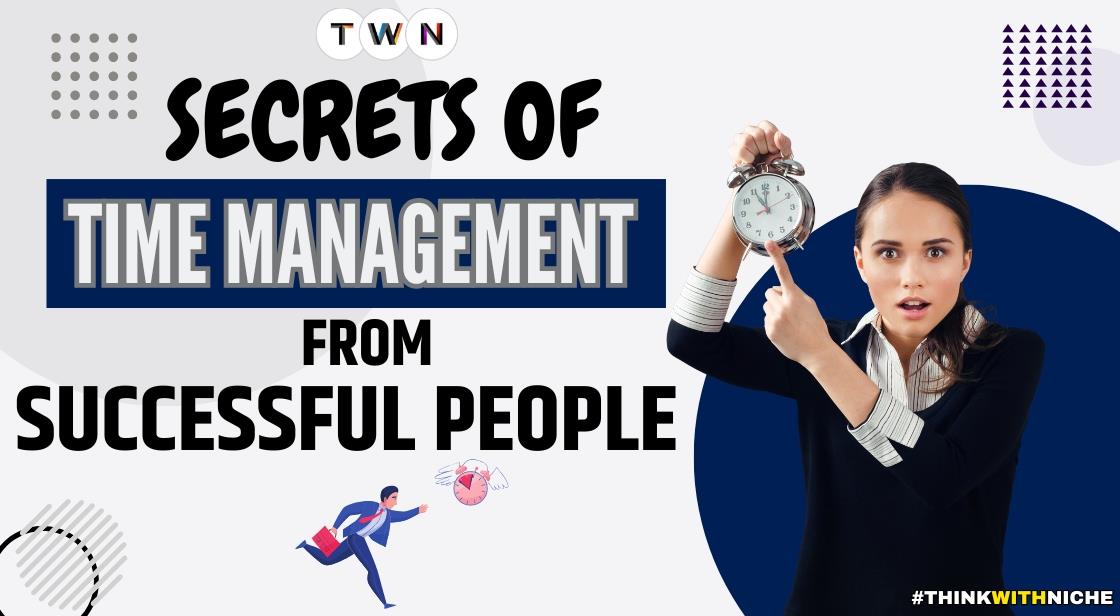Secrets of Time Management from Highly Successful People

Blog Post
In a world where every moment counts, mastering the art of time management has become a hallmark of success. The ability to effectively allocate time is not just a skill; it is a critical factor that distinguishes highly successful individuals from the rest.
From corporate leaders to entrepreneurs, these achievers recognize that time is their most finite resource. They employ a variety of strategies to maximize productivity, maintain a healthy work-life balance, and achieve their goals with precision.
This blog delves into the time management secrets of some of the most successful people in the world. By exploring their techniques—ranging from prioritization and goal setting to leveraging technology and embracing flexibility—we can uncover valuable insights that can be applied to our own lives.
Whether you’re striving for personal growth or professional excellence, these time management principles can help you navigate the complexities of modern life, enhance your efficiency, and ultimately drive you toward your aspirations.
Let’s unlock the secrets to effective time management and discover how you, too, can achieve remarkable success.
Achieving Success Through Effective Time Management
Overview of Time Management Importance
Effective time management is essential for achieving success in both personal and professional realms. It allows individuals to prioritize tasks, meet deadlines, and allocate resources efficiently, leading to increased productivity. Successful people understand that time is a finite resource; thus, they strive to use it wisely to accomplish their goals.
By mastering time management, they can navigate complex schedules and competing demands, ultimately enhancing their overall performance.
Maximizing Productivity
Successful individuals often implement specific strategies to maximize productivity. They set clear priorities, often using tools like to-do lists and digital planners to keep track of tasks. Techniques such as the Pomodoro Technique—where work is broken into intervals followed by short breaks—help maintain focus and energy. By scheduling high-priority tasks during peak productivity times, they ensure that their efforts yield the highest returns.
Maintaining Work-Life Balance
Moreover, effective time management plays a crucial role in maintaining a healthy work-life balance. Successful people often allocate time for personal pursuits and self-care, recognizing that well-being is vital for sustained success. They establish boundaries between work and personal life, which helps prevent burnout and fosters long-term productivity.
1. Prioritization of Tasks
Successful individuals excel at prioritizing tasks based on their importance and urgency. They understand that time is a limited resource and strive to make the most of it by focusing on what truly matters. By distinguishing between high-priority tasks and less important ones, they ensure that their energy is invested in activities that drive results and progress. Prioritization helps avoid distractions, reduces procrastination, and improves overall efficiency.
The Eisenhower Matrix for Decision Making
One common method used by successful people to prioritize tasks is the Eisenhower Matrix, which categorizes tasks into four quadrants: urgent and important, important but not urgent, urgent but not important, and neither urgent nor important. This matrix helps them focus on tasks that align with their long-term goals while minimizing time spent on unproductive activities.
Example: Elon Musk and Time Blocking
A great example of task prioritization in action is Elon Musk, the CEO of SpaceX and Tesla. Known for managing multiple ventures, Musk utilizes a technique called "time blocking" to stay organized and productive. Time blocking involves scheduling every minute of the day into fixed intervals dedicated to specific tasks.
Musk divides his day into five-minute blocks, ensuring that he focuses on the most important activities first, such as strategic decision-making, engineering discussions, and high-level meetings. By sticking to this schedule, Musk effectively manages his demanding workload across various companies.
Delegation and Task Management
In addition to prioritizing tasks, successful people also delegate when appropriate. They understand that they cannot do everything on their own and trust their teams to handle tasks that are less critical. This approach allows them to focus on high-impact decisions and actions.
By mastering the art of task prioritization, successful individuals like Elon Musk are able to achieve extraordinary results and maintain peak productivity in their daily lives.
Also Read: How to Supercharge Your Focus, Increase Motivation, and Boost Drive
2. Setting Clear Goals
Setting Clear Goals for Success
Setting clear goals is one of the most effective ways to manage time and ensure success. By establishing both short-term and long-term objectives, individuals can maintain focus, stay organized, and work more efficiently towards their desired outcomes.
Importance of Short-Term and Long-Term Goals
Short-term goals are immediate targets that help break down larger tasks into manageable steps. They keep individuals on track with daily or weekly activities, ensuring consistent progress. Long-term goals, on the other hand, provide a bigger picture of what one wants to achieve over months or years. Having both types of goals helps in creating a roadmap for success and gives a sense of direction in daily activities.
Staying Focused and Organized
When goals are clearly defined, individuals are more likely to remain focused and avoid distractions. Knowing exactly what needs to be accomplished each day or week helps prioritize tasks and prevents wasting time on less important activities. Being organized also reduces stress, as there’s a clear path to follow, making it easier to move from one task to another with confidence.
Example: Oprah Winfrey’s Goal-Setting Approach
One of the best examples of setting clear goals comes from Oprah Winfrey, a highly successful media mogul. Oprah is known for setting specific, measurable goals for every project she undertakes. Whether launching a new show, starting a philanthropic initiative, or building her business empire, Oprah ensures that each goal is broken down into actionable steps.
This approach allows her to track progress, adjust her strategies if needed, and maintain a clear vision of her long-term aspirations.
By setting clear, actionable goals, successful individuals like Oprah Winfrey manage their time efficiently and achieve extraordinary outcomes. Their ability to focus on measurable objectives helps them stay organized and consistently move forward in their pursuits.
3. Using Technology and Tools for Time Management
Leveraging Technology to Streamline Tasks
Successful individuals understand the power of technology in simplifying complex tasks and enhancing productivity. By adopting various digital tools and applications, they can effectively manage their time, stay organized, and focus on what truly matters. Technology eliminates the need for manual tracking, allowing them to automate routine activities, set reminders, and streamline work processes.
Enhancing Productivity with Digital Tools
Digital tools, like project management apps and scheduling software, provide an efficient way to stay on top of multiple tasks without feeling overwhelmed. For example, tools such as Trello or Asana allow users to break down larger projects into manageable steps, assign deadlines, and track progress. This ensures that nothing is overlooked, and tasks are completed in an orderly manner.
Example: Bill Gates and Microsoft Outlook
One of the most prominent figures who leverages technology for effective time management is Bill Gates. As the founder of Microsoft, Gates has long been an advocate of using digital tools to enhance productivity. He frequently uses Microsoft Outlook to manage his calendar and tasks. Outlook enables him to organize his day by setting up meetings, scheduling reminders, and prioritizing tasks based on importance.
This organized structure ensures that he stays on track with his deadlines and manages his time efficiently, even with a packed schedule.
4. Delegation of Responsibilities: Key to Effective Time Management
Delegation is a crucial time management strategy often employed by successful individuals. It allows them to focus on high-priority tasks while assigning other responsibilities to capable team members. Delegating tasks effectively not only saves time but also boosts productivity and empowers others within the organization.
Why Delegation is Important
By delegating responsibilities, successful people can concentrate on areas that require their direct attention, such as strategic decision-making and innovation. They recognize that trying to manage every task on their own would not only lead to burnout but also limit their ability to focus on activities that drive growth. Delegation ensures that tasks are completed efficiently while freeing up time for higher-level priorities.
Richard Branson: A Master of Delegation
Richard Branson, the founder of the Virgin Group, is a strong advocate of delegation. With a business empire spanning multiple industries, Branson credits much of his success to trusting his team to handle responsibilities. He delegates tasks to capable individuals and empowers them to make decisions, allowing him to focus on big-picture thinking, innovation, and expansion. Branson’s approach ensures that while his companies run smoothly, he has the bandwidth to work on future ventures and creative solutions.
Empowering the Team
When leaders like Richard Branson delegate tasks, they also foster a sense of trust and ownership within their team. This empowerment leads to a motivated workforce that feels valued and responsible for their contributions. Branson believes that by giving employees the freedom to manage their roles, they grow professionally, which in turn benefits the entire organization.
5. Creating Routines and Habits for Effective Time Management
Establishing daily routines and habits is one of the most powerful strategies for managing time effectively. It helps in creating consistency and discipline, allowing individuals to optimize their productivity and focus on what matters most.
Importance of Routines
Routines provide structure to the day, reducing the need for constant decision-making about what to do next. This helps save mental energy and prevents decision fatigue, which can arise from continuously having to choose between tasks. Routines also make it easier to stick to good habits and avoid procrastination. By setting up a specific schedule for regular tasks like exercise, work, or rest, people can streamline their daily efforts and increase overall productivity.
How Routines Build Discipline
When routines become habits, they enforce discipline naturally. By following a set routine, individuals don't have to rely on willpower alone to get things done. They create a flow that becomes second nature, which makes it easier to focus on tasks and minimize distractions. For instance, having a fixed time for important activities like checking emails, doing focused work, or even relaxing helps in managing time better, ensuring that each activity gets the attention it deserves.
Example: Tim Ferriss and Morning Routines
Tim Ferriss, the bestselling author of The 4-Hour Workweek, is a strong advocate of morning routines. He believes that the way one starts their morning sets the tone for the rest of the day. Ferriss incorporates specific practices such as exercise, meditation, and planning his day. By doing these activities early, Ferriss builds momentum, ensuring he is focused, energized, and ready to tackle the day's challenges. This simple yet effective routine helps him maintain productivity and a clear mindset.
6. Limiting Distractions: A Key to Success
Minimizing distractions is crucial for maintaining focus and efficiency, especially in a world full of constant interruptions. Successful people often implement strategies to avoid distractions, allowing them to work on high-priority tasks and achieve their goals.
Importance of Minimizing Distractions
Distractions can severely impact productivity, leading to longer work hours and incomplete tasks. Studies have shown that it takes an average of 23 minutes to refocus on a task after being distracted. This loss of time can accumulate, making it difficult to stay on track. Successful individuals recognize this challenge and take deliberate steps to limit distractions in their daily routines.
Example: Mark Zuckerberg’s Approach
One notable example of minimizing distractions is Mark Zuckerberg, CEO of Meta (formerly Facebook). Zuckerberg is known for his intense focus on strategic decision-making and innovation, which has played a pivotal role in Meta's growth. To maintain his focus, he has made conscious efforts to limit distractions, including reducing his personal use of social media platforms, despite being the head of one of the world’s largest social media companies.
Additionally, Zuckerberg creates a distraction-free environment by simplifying daily decisions. For instance, he famously wears the same style of clothing every day, explaining that it eliminates the need to make trivial decisions, allowing him to concentrate on more critical business matters.
Creating a Distraction-Free Environment
Zuckerberg's approach is just one example of how successful people manage distractions. Others employ techniques such as scheduling focused work hours, setting clear boundaries, and using tools that block notifications or limit internet usage. These practices help in reducing unnecessary interruptions and improving overall efficiency.
7. Embracing Flexibility and Adaptability in Time Management
The Importance of Flexibility
In today’s fast-paced world, time management requires more than just sticking to a rigid schedule. While having structure is essential for productivity, embracing flexibility allows individuals to adjust to unexpected challenges and opportunities. Being adaptable in how we manage time helps in maintaining efficiency, especially in situations that demand quick thinking and changes in plans.
Balancing Structure and Adaptability
While many successful people rely on detailed schedules to stay on track, they also leave room for adjustments. Flexibility doesn’t mean abandoning structure; it means recognizing when priorities shift and being able to respond effectively. This balanced approach ensures that essential tasks are completed while still allowing for changes in daily plans.
Example: Angela Merkel’s Adaptability
A great example of this adaptability in time management is former German Chancellor Angela Merkel. Known for her calm and methodical decision-making, Merkel demonstrated the ability to adjust her strategies in response to changing circumstances. Whether dealing with the Eurozone crisis or the COVID-19 pandemic, Merkel’s flexible approach enabled her to manage crises effectively while still prioritizing her broader objectives. Her ability to shift focus and reallocate time as needed was a key factor in her long-standing success as a leader.
The Benefits of Flexibility in Time Management
Embracing flexibility allows for better problem-solving and decision-making. It helps individuals stay calm under pressure and make adjustments without losing momentum. Successful people understand that rigidly sticking to a plan can be counterproductive when circumstances change. Flexibility fosters resilience and helps people navigate complex situations with greater ease.
8. Regular Review and Reflection
Importance of Regular Review
Regular review and reflection are critical components of effective time management and personal development for successful individuals. By consistently assessing their goals, strategies, and performance, they can stay aligned with their objectives and make necessary adjustments. This practice not only helps in identifying areas for improvement but also reinforces the commitment to their long-term vision. Successful people understand that the path to achievement is rarely linear, and regularly revisiting their progress allows them to navigate challenges effectively.
How Successful People Implement Reviews
Successful individuals often set specific intervals for reviewing their goals—be it weekly, monthly, or quarterly. This structured approach helps them break down their larger aspirations into manageable milestones, making it easier to track progress. During these reviews, they evaluate their achievements against their set objectives, analyze any setbacks, and identify trends that may indicate whether their strategies are working or need modification.
The Role of Reflection
Reflection goes hand-in-hand with review. It involves a deeper introspection of experiences, decisions, and outcomes. Successful people, such as Tony Robbins, emphasize the significance of reflecting on both accomplishments and failures. This process allows them to extract valuable lessons, fostering continuous learning and growth. By understanding what worked and what didn’t, they can fine-tune their approaches and enhance their effectiveness moving forward.
Example: Tony Robbins
Tony Robbins exemplifies the practice of regular review and reflection. As a renowned motivational speaker and life coach, he conducts thorough assessments of his progress and outcomes. Robbins utilizes various techniques, including journaling and goal-setting frameworks, to evaluate his performance. By adjusting his strategies based on these assessments, he ensures that he remains focused on his long-term vision. His commitment to continuous improvement through regular reflection illustrates how this practice is essential for maintaining success and achieving personal goals.
In conclusion,
Effective time management is not merely a set of techniques; it is a mindset that can transform the way we approach our goals and aspirations. The strategies employed by highly successful individuals—such as prioritization, delegation, and the use of technology—offer invaluable lessons that anyone can adopt. By learning to manage our time wisely, we create space for innovation, reduce stress, and increase our overall productivity.
As we reflect on the secrets shared by these accomplished individuals, it's essential to recognize that success is not just about working harder but about working smarter. Implementing even a few of these strategies can lead to significant improvements in both our personal and professional lives. So, take a moment to evaluate how you currently manage your time, and consider making small adjustments that align with the practices of those who have achieved remarkable success.
Remember, time is a resource we can never get back—let’s use it wisely to build the future we desire.
You May Like
EDITOR’S CHOICE












